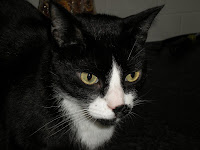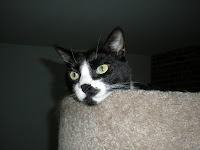 Sherman is a ten-year-old kitty whose owners brought him in to see me for his annual exam. Overall, Sherman looked good, but I noticed that he had lost almost two pounds since last year and had developed a heart murmur. I asked his owners whether they had seen any changes in Sherman’s appetite. Was he eating more than usual? Did he always seem hungry? They assured me that Sherman’s appetite was unchanged.
Sherman is a ten-year-old kitty whose owners brought him in to see me for his annual exam. Overall, Sherman looked good, but I noticed that he had lost almost two pounds since last year and had developed a heart murmur. I asked his owners whether they had seen any changes in Sherman’s appetite. Was he eating more than usual? Did he always seem hungry? They assured me that Sherman’s appetite was unchanged.Weight loss in a senior cat can mean many things, but given the new heart murmur I was strongly suspicious of hyperthyroidism. We submitted bloodwork, including urine and a thyroid test. Sherman’s bloodwork confirmed that he had an elevated thyroid level. This was most likely responsible for the weight loss and heart murmur.
The thyroid gland plays a key role in regulating the body’s metabolism and when enlarged it produces an increased amount of hormones which can then affect multiple organs. Symptoms include increased thirst, urination and appetite, vomiting, diarrhea and weight loss. Cardiovascular side effects also occur: when a cat’s metabolism increases, the heart is stimulated to pump faster and more forcefully. This leads to thickening of the heart muscle, resulting in abnormal blood flow, which is heard as a murmur. High blood pressure - also known as hypertension - is another result of the cardiovascular changes that can occur. This can result in neurologic abnormalities, kidney disease and retinal detachment, which results in blindness.
We checked Sherman’s blood pressure, which fortunately was normal, and started him on a medication called methimazole that lowers the amount of hormones the thyroid produces. Our cardiologist, Dr. Braz-Ruivo, conducted an ultrasound to evaluate Sherman’s heart murmur. This was done to evaluate if any heart disease was present and make sure he didn’t need any additional medication to help his heart work more efficiently. Sherman responded very well to the thyroid medication and did not develop any underlying kidney disease, which often shows up after the thyroid is properly regulated.
Though Sherman’s owners chose to manage his hyperthyroidism with medication, another option was available: Radioactive iodine therapy is a procedure that attacks the overactive thyroid cells and produces permanent results. This is generally considered the gold standard of treatment for feline hyperthyroidism. It works very well but is expensive. Also, regardless of blood pressure, if any underlying kidney disease is present, the patient could develop chronic kidney disease once the thyroid is corrected.

It took a few adjustments to find the correct dose for his medication, but Sherman’s hyperthyroidism is now well regulated. We’ll keep an eye on his thyroid levels with bloodwork each time he comes in for his annual exam. During his last visit he was doing great and had gained back all the weight he initially lost.








No comments:
Post a Comment